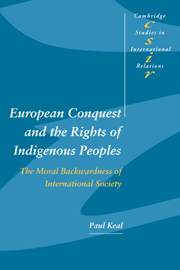 European Conquest and the Rights of Indigenous Peoples
European Conquest and the Rights of Indigenous Peoples Published online by Cambridge University Press: 03 December 2009
This book investigates the representation of indigenous peoples and the denial of their sovereign rights as an important but neglected aspect of the expansion of international society. The expansion of the European society of states to an international society global in scope entailed the progressive dispossession and subordination of non-European peoples. As well as being a society of states international society represents a moral community with shifting boundaries. From its inception these boundaries were drawn in ways that involved the simultaneous inclusion and exclusion of certain categories of non-Europeans. In the early phases of European expansion the first nations encountered by Europeans were granted rights but these were gradually eroded in response to the changing demands of European colonists. These rights are now being reclaimed by indigenous peoples in ongoing struggles with the settler societies in which they are located.
International society assumes the legitimacy of states as a form of political organisation and has as one of its purposes the preservation of the states system. It also sets the standards against which the moral standing of states is measured. Increasingly, the moral standing or legitimacy of particular states is bound up with the extent to which other members of international society perceive them to be protecting the rights of their citizens. In this book I am particularly interested in the ways in which indigenous rights are also fundamental to the moral legitimacy of particular states.
To save this book to your Kindle, first ensure [email protected] is added to your Approved Personal Document E-mail List under your Personal Document Settings on the Manage Your Content and Devices page of your Amazon account. Then enter the ‘name’ part of your Kindle email address below. Find out more about saving to your Kindle.
Note you can select to save to either the @free.kindle.com or @kindle.com variations. ‘@free.kindle.com’ emails are free but can only be saved to your device when it is connected to wi-fi. ‘@kindle.com’ emails can be delivered even when you are not connected to wi-fi, but note that service fees apply.
Find out more about the Kindle Personal Document Service.
To save content items to your account, please confirm that you agree to abide by our usage policies. If this is the first time you use this feature, you will be asked to authorise Cambridge Core to connect with your account. Find out more about saving content to Dropbox.
To save content items to your account, please confirm that you agree to abide by our usage policies. If this is the first time you use this feature, you will be asked to authorise Cambridge Core to connect with your account. Find out more about saving content to Google Drive.